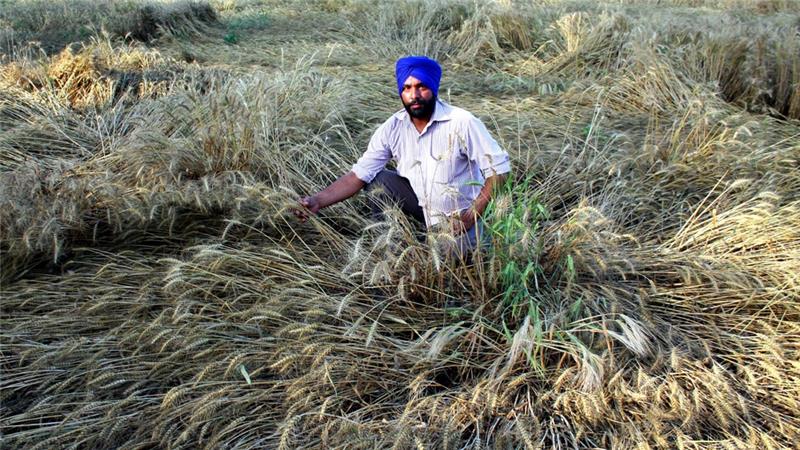
A farmer in Patiala, India shows damage to wheat caused by unseasonably heavy rains in April 2015. While India and Pakistan don’t see eye to eye on pretty much anything, climate change dangers may help finally bring them together. Photo: Getty Images via aljazeera.com
Relations between India and Pakistan have been notoriously frosty for decades. But the two long-time adversaries will soon need to work together to effectively combat literal frost: in other words the effects of climate change.
Neil Bhatiya, a policy associate at the Century Foundation, reports that monsoon-level rains pounded Pakistan this past April — much earlier than expected — and resulted in at least 37 deaths. At the same time, unusually heavy spring rain also decimated wheat crops in India. Farming remains critically important to both countries’ economies: The World Bank estimates that about 47 percent of India’s, and 45 percent of Pakistan’s, workforce is employed in the agriculture and rural development sector.
In addition to impacts on the economy, both Mumbai and Karachi are susceptible to problems caused by rising sea levels. Just this week India suffered a debilitating heat wave that killed over 500 people. If these recent extremes are signs of things to come — and the Intergovernmental Panel on Climate Change predicts a higher rate of severe weather events in the next century — India and Pakistan could face significant environmental, economic and societal upheaval.
The situation may not be not as grim as it seems. Cooperation has already taken place between the two neighboring countries on the the Indus Waters Treaty, a scheme to share river resources that has been in place since the 1960s. Leadership in India and Pakistan have made some progress in developing renewable energy sources, notably solar.
Thus far these efforts have been pursued separately. India and Pakistan must somehow find a way to pool their ideas and initiatives. If they can, as Bhatiya writes, such interaction could “serve as confidence building measures for climate change cooperation an important cornerstone of the bilateral relationship, to the benefit of the region as a whole.”
Enemies for so long, India and Pakistan are linked by their geography and potential to be devastated by climate change. If anything could bring them together, it should be this.